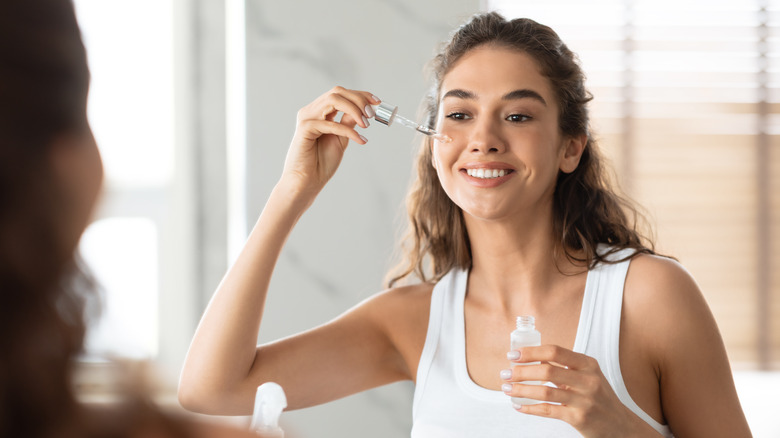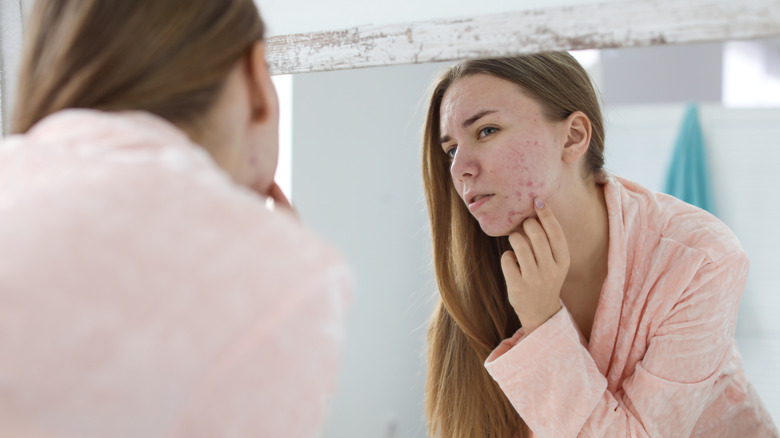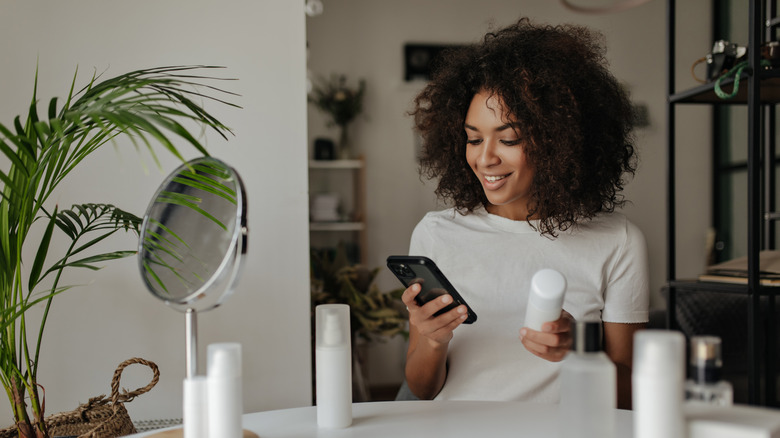What You Should Know Before Buying A New Facial Serum
We may receive a commission on purchases made from links.
When it comes to skincare, figuring out which products, tools, and techniques to include in your routine can be overwhelming. According to SkinStore, the vast majority of women use an average of 16 products a day on their skin, between skincare and makeup. For some, these routines are rigorous and very involved, with a specific vision in mind of how they want their skin to look. For others, these wellness routines are simply a guessing game of which products won't break them out into acne or make their skin issues worse.
As you're browsing through the aisles of your local drugstore or Sephora, you're bound to notice an abundance of serums available to try. Unless you're pretty familiar with most trending ingredients or brands, the wide array of serum options may make your head spin. What should you choose to buy, what would work best for your skin, and what products are worth it? These are all valid questions that many of us find ourselves asking when trying to determine the best facial serums to buy. Not only that, but it's also crucial to keep in mind any skin sensitivities or reactions to certain ingredients (per POPSUGAR). If you're in this predicament, here are a few top tips to keep in mind when you're buying a new face serum.
Determine your skin issues and goals
As is true with investing in any new skincare product, it's important to fully understand your skin before buying a new face serum. Becoming totally familiar with your skin's texture, level of sensitivity, and any long-standing issues (like dryness or hyperpigmentation) is critical to choosing the most effective skin products for you. While you can possibly achieve this with trial-and-error over time, Fashion Gone Rogue suggests consulting with a dermatologist to figure out your exact skin type and needs.
Once you've become "one" with your skin and its specific needs, then it's time to decide exactly what you want your face serum to tackle. Are you dealing with dry patches? Then it might be a good idea to invest in a hydrating, oil-based serum (per Prevention). On the other hand, if your skin is oily and acne-prone, you might need a product to tackle the root of the issue and clear up your complexion. Targeting the goals you have for improving your skin will help you decide on the best facial serum to buy.
Get familiar with ingredients and the best practices for use
While it may be tempting to purchase a bottle of the trendiest product you see on TikTok or Instagram, committing yourself to understand the purpose behind and efficacy of a new facial serum before buying it will save you lots of time, money, (and possibly pimples) in the long run. Valued at $511 billion dollars in 2021 (via Common Thread Co), the beauty industry knows how to market — and therefore sell — just about any and every product. Equip yourself with confidence knowing that you know what's best for your specific skin, and you won't fall victim to the scheme.
Depending on your skin type and what issues you're trying to solve, it's important to become familiar with common ingredients formulated to tackle those issues. For example, if you have oily skin, ingredients like niacinamide or salicylic acid can be useful for keeping your skin balanced and clear of acne or excess oils (per Byrdie). Again, consulting with a Dermatologist would be most ideal for figuring out which products will best tackle your skin's needs, but doing your own research can still go a long way.
Just as important as understanding ingredients, learning the proper order of steps for your routine is always a good idea. Layering multiple skincare products in one sitting can be a super-effective way to treat a variety of skin issues, but only if they are used in the correct ways. In terms of face serums specifically, they should always be applied last, according to InStyle.


